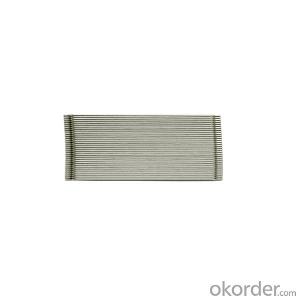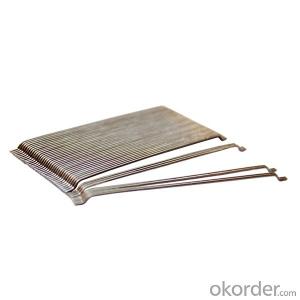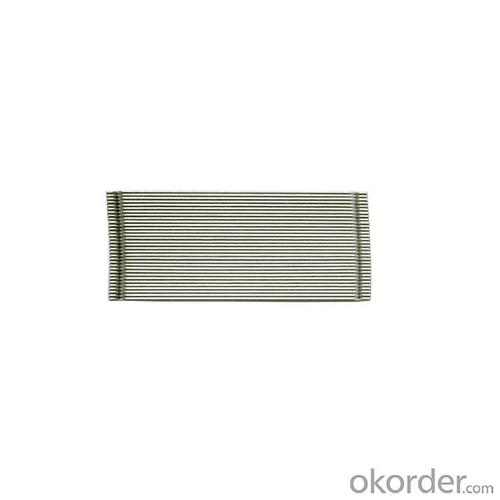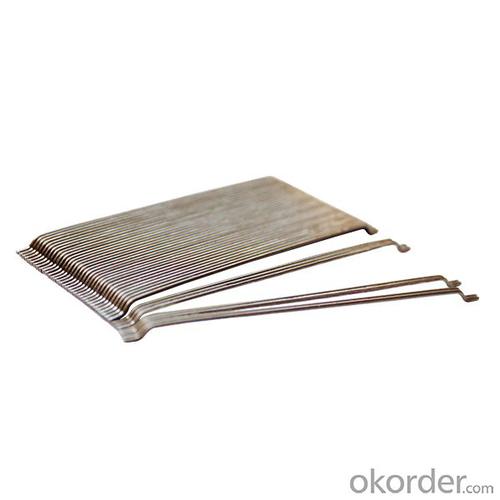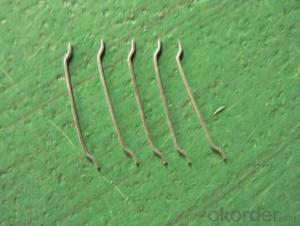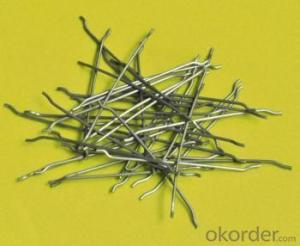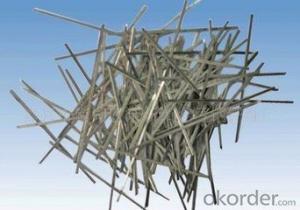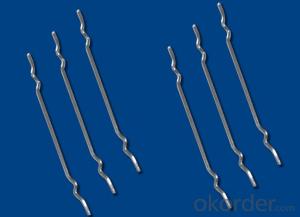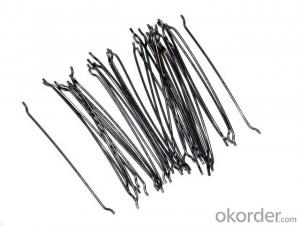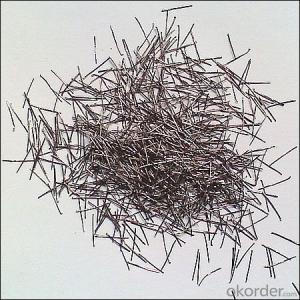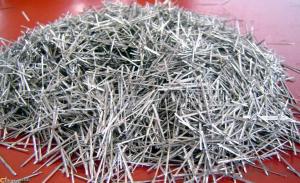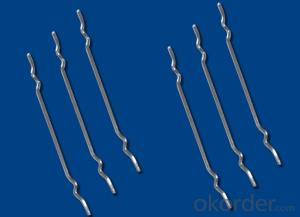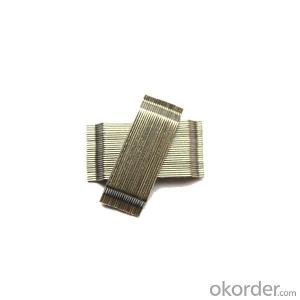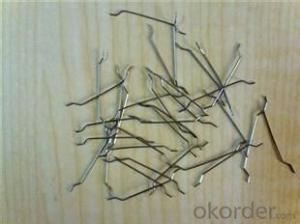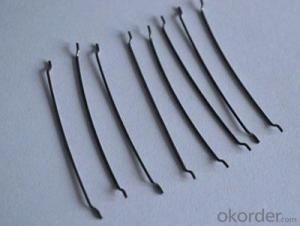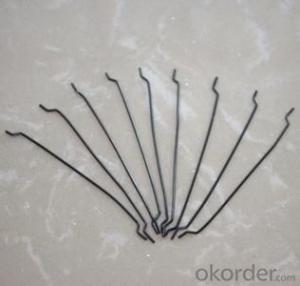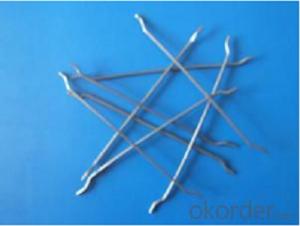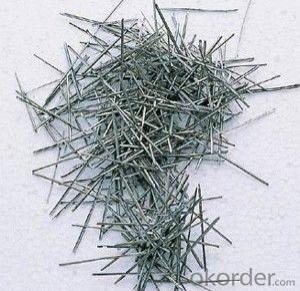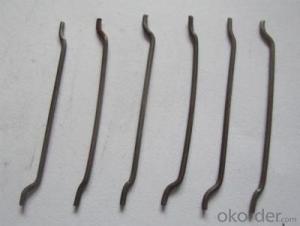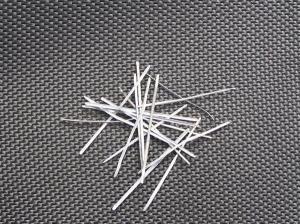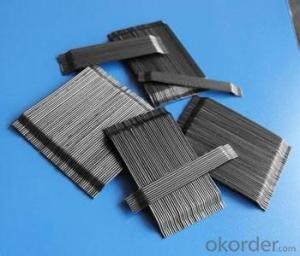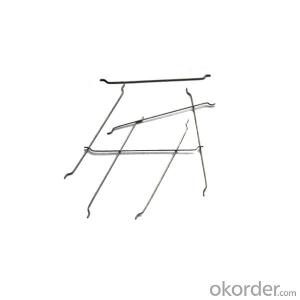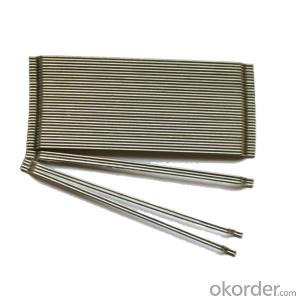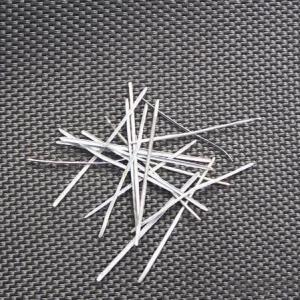Melt Extract Stainless Steel Fiber Concrete Steel Fiber 0.75/50 from CNBM China
- Loading Port:
- Tianjin
- Payment Terms:
- TT OR LC
- Min Order Qty:
- 1 m.t.
- Supply Capability:
- 5000 m.t./month
OKorder Service Pledge
Quality Product, Order Online Tracking, Timely Delivery
OKorder Financial Service
Credit Rating, Credit Services, Credit Purchasing
You Might Also Like
Quick Details
Place of Origin: Tianjin, China (Mainland)
Model Number: 0.75
Material: Steel
Production Process: Cold drawn
Lengh: 50
Type: 1
Compressive Strength: >1200MPa
Aspect ratio: 66
Standard: ASTM A820M-11
Section Shape: Circular
Application: Concrete Reinforcement
Packaging & Delivery
| Packaging Details: | 20 kg/Bag,50 bags/Pallet or 1,000kg/ Bulk Bag |
|---|---|
| Delivery Detail: | 1 Month |
Product Description
| Diameter | 0.75 | mm | 0.03 | in |
| Length | 50.00 | mm | 1.96 | in |
| Aspect Ratio | 67 | |||
| Tensile strength | 1200 MPa | |||
| Type | Cold drawn Steel Fiber | |||
| End | Hooked-end Steel Fiber | |||
| Glued/Loose | Glued Steel Fiber | |||
| Bending Angle | 45°(min.30°) | |||
| Usage & Performance | Floor:Trafficked areas and Industrial floors | |||
| Shotcrete :Slope stabilization and Final lining | ||||
| Precast concrete:Pipe and Railway sleepers | ||||
| Packing | Standard Export Pallet Packing | Bag Packing | 20 kg/Bag,50 bags/Pallet | |
| Bulk Packing | 1,000kg/ Bulk Bag | |||
| Loading Quantity | 20’GP | 20-25 Tonne/Tonnes | ||
| 40’GP | 25-27 Tonne/Tonnes | |||
| 40’HQ | 25-27 Tonne/Tonnes | |||
| MOQ | 1 kg for trial order | |||
| Supply Ability | 10,000 Tonne/Tonnes per Year | |||
| Payment Terms | T/T or L/C at sight | |||
| Delivery Time | Within 15 days after receiving deposit or original L/C at sight | |||
| Certification | ISO9001:2000, CE, | |||
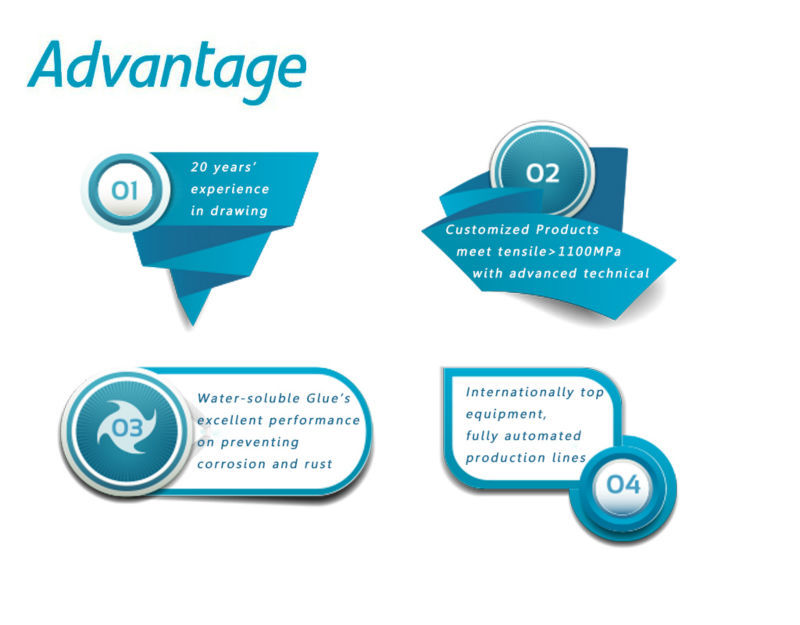
| Product | Diameter | Length mm/in | Aspect Ratio | Type | Packing |
| G-6030 | 0.5 mm (0.0197 in) | 30 mm (1.1811 in) | 60 | Glued | 20 kg/Bag, or 1,000kg/ Bulk Bag |
| G-6535 | 0.55 mm (0.0217 in) | 35 mm (1.3780 in) | 65 | Glued | 20 kg/Bag, or 1,000kg/ Bulk Bag |
| G-6035 | 0.6 mm (0.0236 in) | 35 mm (1.3780 in) | 60 | Glued | 20 kg/Bag, or 1,000kg/ Bulk Bag |
| G-8060 | 0.75 mm (0.0295 in) | 60 mm (2.3622 in) | 80 | Glued | 20 kg/Bag, 50 bags/Pallet |
| G-6060 | 0.9 mm (0.0354 in) | 60 mm (2.3622 in) | 60 | Glued | 20 kg/Bag, 50 bags/Pallet |
| G-6030 | 0.5 mm (0.0197 in) | 30 mm (1.1811 in) | 60 | Loose | 20 kg/Bag, or 1,000kg/ Bulk Bag |
| G-6535 | 0.55 mm (0.0217 in) | 35 mm (1.3780 in) | 65 | Loose | 20 kg/Bag, or 1,000kg/ Bulk Bag |
| G-6035 | 0.6 mm (0.0236 in) | 35 mm (1.3780 in) | 60 | Loose | 20 kg/Bag, or 1,000kg/ Bulk Bag |
| G-8060 | 0.75 mm (0.0295 in) | 60 mm (2.3622 in) | 80 | Loose | 20 kg/Bag, 50 bags/Pallet |
| G-6060 | 0.9 mm (0.0354 in) | 60 mm (2.3622 in) | 60 | Loose | 20 kg/Bag, 50 bags/Pallet |
- Q: Can melt extract stainless steel fiber be used in marine structures?
- Yes, melt extract stainless steel fiber can be used in marine structures. Its corrosion resistance properties make it suitable for applications in marine environments where it can withstand exposure to saltwater and moisture without losing its structural integrity.
- Q: Does melt extract stainless steel fiber enhance the impact resistance of concrete slabs?
- Yes, melt extract stainless steel fiber does enhance the impact resistance of concrete slabs.
- Q: What is the effect of melt extract stainless steel fiber on the autogenous shrinkage of concrete?
- Concrete experiences a reduction in autogenous shrinkage when the melt extract stainless steel fiber is utilized. Autogenous shrinkage refers to the natural self-drying and subsequent volume decrease of concrete caused by the hydration process. Incorporating stainless steel fibers into the concrete generates a three-dimensional reinforcement network within the matrix. This network strengthens the tensile strength and ductility of the entire concrete. Furthermore, the stainless steel fibers serve as micro-reinforcements, preventing the creation and propagation of cracks during the early stages of concrete hydration. By minimizing crack formation, the stainless steel fibers decrease the likelihood of moisture loss from the concrete. Consequently, this reduces autogenous shrinkage. Acting as a barrier, the stainless steel fibers impede water evaporation from the concrete, maintaining higher moisture levels in the matrix. Additionally, the melt extract stainless steel fibers possess a higher aspect ratio and superior dispersion in comparison to other fiber types like polypropylene or carbon fibers. This improved dispersion guarantees a more even distribution of the fibers throughout the concrete, further enhancing their effectiveness in decreasing autogenous shrinkage. Ultimately, the inclusion of melt extract stainless steel fibers in concrete significantly diminishes autogenous shrinkage by preventing crack formation and minimizing moisture loss. This leads to a more durable and crack-resistant concrete structure.
- Q: Can melt extract stainless steel fiber be used in shot blast applications?
- Certainly! Melt extract stainless steel fibers are applicable for shot blast applications. Shot blasting refers to the high-speed propulsion of abrasive materials to cleanse, refine, or fortify surfaces. In order to bolster the durability and efficacy of this process, stainless steel fibers are frequently incorporated. Melt extract stainless steel fibers are specifically crafted to endure the demanding conditions encountered during shot blasting. Their production involves melting stainless steel and promptly cooling it to create fine fibers possessing exceptional tensile strength, as well as resistance to corrosion and heat. Consequently, these properties render them highly suitable for shot blast applications, as they can withstand the abrasive impact and heat generated throughout the operation. Employing melt extract stainless steel fibers in shot blasting can yield various advantages. Firstly, they amplify the cleansing and refining capabilities of the abrasive materials employed, resulting in a more efficient and effective process. Additionally, the inclusion of stainless steel fibers reinforces and strengthens the surface being blasted, thus boosting its durability and lifespan. To conclude, melt extract stainless steel fibers are indeed well-suited for utilization in shot blast applications. Their exceptional tensile strength, resistance to corrosion, and ability to withstand heat make them an optimal choice for enhancing the performance and longevity of shot blasting processes.
- Q: What is the effect of melt extract stainless steel fiber on the plastic shrinkage of concrete?
- The effect of melt extract stainless steel fiber on the plastic shrinkage of concrete is that it helps reduce the occurrence of plastic shrinkage cracking. The fibers act as reinforcement within the concrete, improving its overall tensile strength and reducing the potential for shrinkage-related cracks. Additionally, the stainless steel fibers help to distribute stress more evenly throughout the concrete, minimizing the formation of shrinkage cracks caused by drying shrinkage.
- Q: Can melt extract stainless steel fiber improve the resistance of concrete to fire?
- Yes, melt extract stainless steel fiber can improve the resistance of concrete to fire. Stainless steel fibers are known for their high melting point and excellent heat resistance properties. When added to concrete, they can enhance its ability to withstand high temperatures and prevent spalling, cracking, and structural failure during a fire. The fibers act as reinforcement, improving the overall fire resistance of the concrete and extending its durability under extreme heat conditions.
- Q: Can melt extract stainless steel fiber be added to cementitious grouts?
- It is possible to incorporate melt extract stainless steel fiber into cementitious grouts. These fibers are often utilized as a reinforcement material in cementitious products to boost their mechanical properties. By introducing stainless steel fibers into grouts, one can enhance their tensile strength, flexural strength, and resistance to cracks. Furthermore, the inclusion of stainless steel fibers aids in managing shrinkage and preventing cracking. All in all, the integration of melt extract stainless steel fibers into cementitious grouts can elevate their effectiveness and longevity.
- Q: Is melt extract stainless steel fiber suitable for use in pre-stressed concrete?
- Yes, melt extract stainless steel fiber is suitable for use in pre-stressed concrete. Stainless steel fibers are known for their high tensile strength, corrosion resistance, and ability to improve the performance of concrete. In pre-stressed concrete, where tension is applied to the concrete before it is loaded, the use of stainless steel fibers can enhance the overall strength and durability of the structure. Melt extract stainless steel fibers are made by melting stainless steel and then rapidly cooling it to form fine fibers. This process ensures that the fibers have a consistent shape and size, which is crucial for their effectiveness in pre-stressed concrete. The fibers are typically added to the concrete mix during the mixing process, where they are evenly distributed throughout the mixture. The addition of melt extract stainless steel fibers helps to reduce cracking and increase the flexural strength of pre-stressed concrete. The fibers act as reinforcement, providing additional tensile strength to the concrete and improving its resistance to cracking under tension. This is particularly important in pre-stressed concrete, where the concrete must withstand significant forces without fracturing. Furthermore, stainless steel fibers are resistant to corrosion, which is essential for long-term durability in pre-stressed concrete. Unlike other types of fibers, melt extract stainless steel fibers do not degrade over time due to exposure to moisture or chemicals present in the concrete. This ensures that the fibers will continue to provide reinforcement and enhance the performance of the pre-stressed concrete structure for an extended period. Overall, melt extract stainless steel fiber is a suitable choice for use in pre-stressed concrete. Its high tensile strength, corrosion resistance, and ability to improve the performance of concrete make it an excellent reinforcement material for pre-stressed concrete structures.
- Q: Can melt extract stainless steel fiber improve the bond strength of concrete to epoxy coatings?
- The use of melt extract stainless steel fiber is effective in enhancing the bond strength between concrete and epoxy coatings. Stainless steel fibers are frequently employed as reinforcement in concrete to increase its tensile strength and durability. Once incorporated into concrete, these fibers aid in the distribution and dissipation of stress, thereby minimizing crack formation and enhancing the overall structural integrity. In the context of epoxy coatings, the inclusion of melt extract stainless steel fibers offers numerous advantages. Firstly, these fibers serve as mechanical anchors, improving the bond between the concrete and the epoxy coating. This enhanced bond strength ensures that the coating remains securely attached to the concrete surface, even when subjected to stress or movement. Secondly, the presence of stainless steel fibers also helps in reducing crack formation within the epoxy coating. By reinforcing the concrete substrate, these fibers distribute any stress or load applied to the coating more evenly, thus reducing the likelihood of crack formation due to localized stress concentrations. Moreover, melt extract stainless steel fibers contribute to the overall durability and lifespan of the epoxy coating. They provide added protection against impact, abrasion, and other forms of wear and tear that the coating may experience over time. This increased durability results in epoxy coatings that are longer-lasting and more resilient. In conclusion, the addition of melt extract stainless steel fiber significantly improves the bond strength between concrete and epoxy coatings. By enhancing the mechanical connection and providing additional reinforcement, these fibers contribute to a stronger, more durable, and longer-lasting bond.
- Q: How does melt extract stainless steel fiber impact the load transfer between concrete layers?
- Melt extract stainless steel fibers enhance load transfer between concrete layers by improving the bond strength and overall mechanical properties of the concrete. These fibers act as reinforcement, dispersing stress and preventing crack propagation, thereby increasing the load-carrying capacity and durability of the concrete structure.
Send your message to us
Melt Extract Stainless Steel Fiber Concrete Steel Fiber 0.75/50 from CNBM China
- Loading Port:
- Tianjin
- Payment Terms:
- TT OR LC
- Min Order Qty:
- 1 m.t.
- Supply Capability:
- 5000 m.t./month
OKorder Service Pledge
Quality Product, Order Online Tracking, Timely Delivery
OKorder Financial Service
Credit Rating, Credit Services, Credit Purchasing
Similar products
Hot products
Hot Searches
Related keywords
